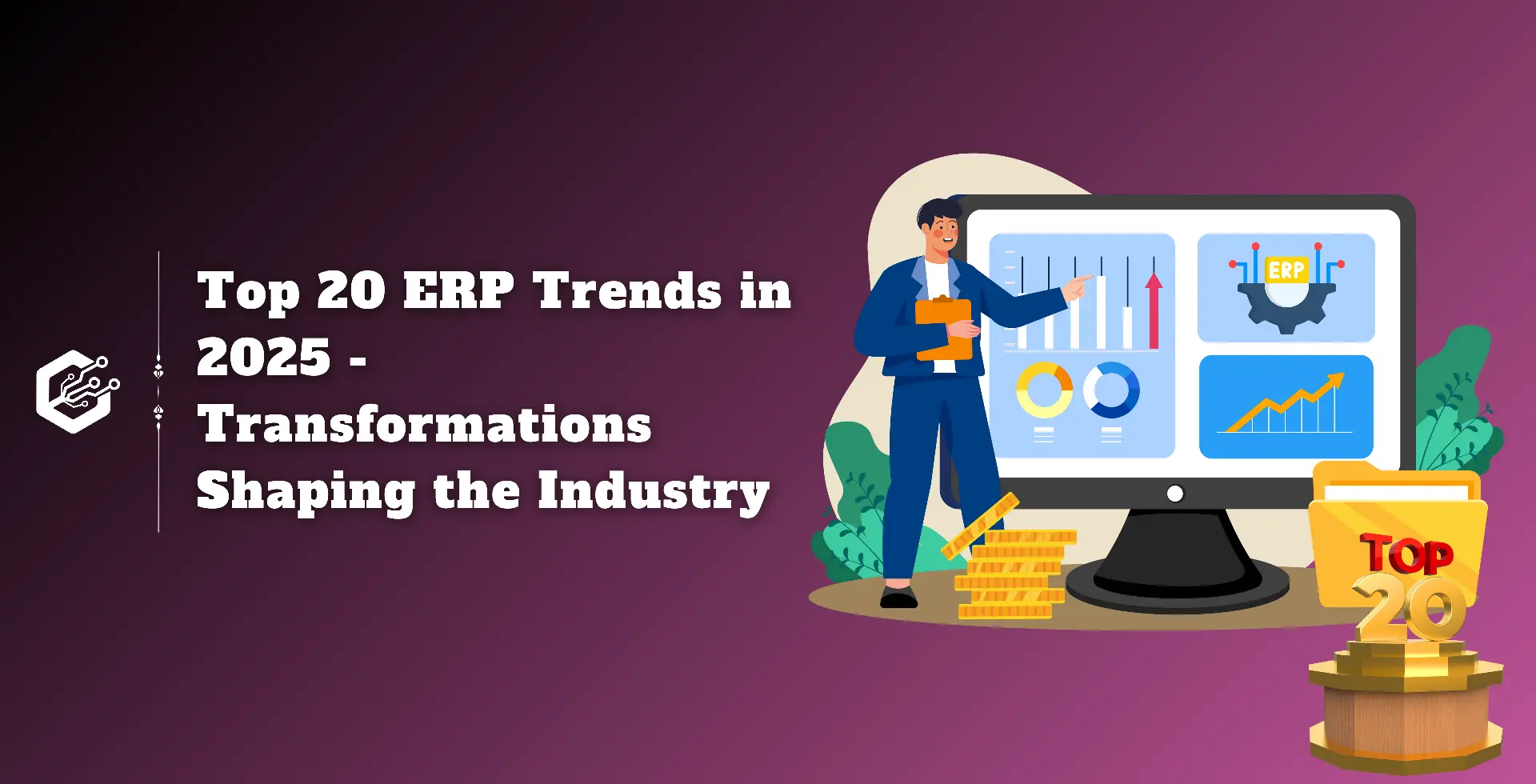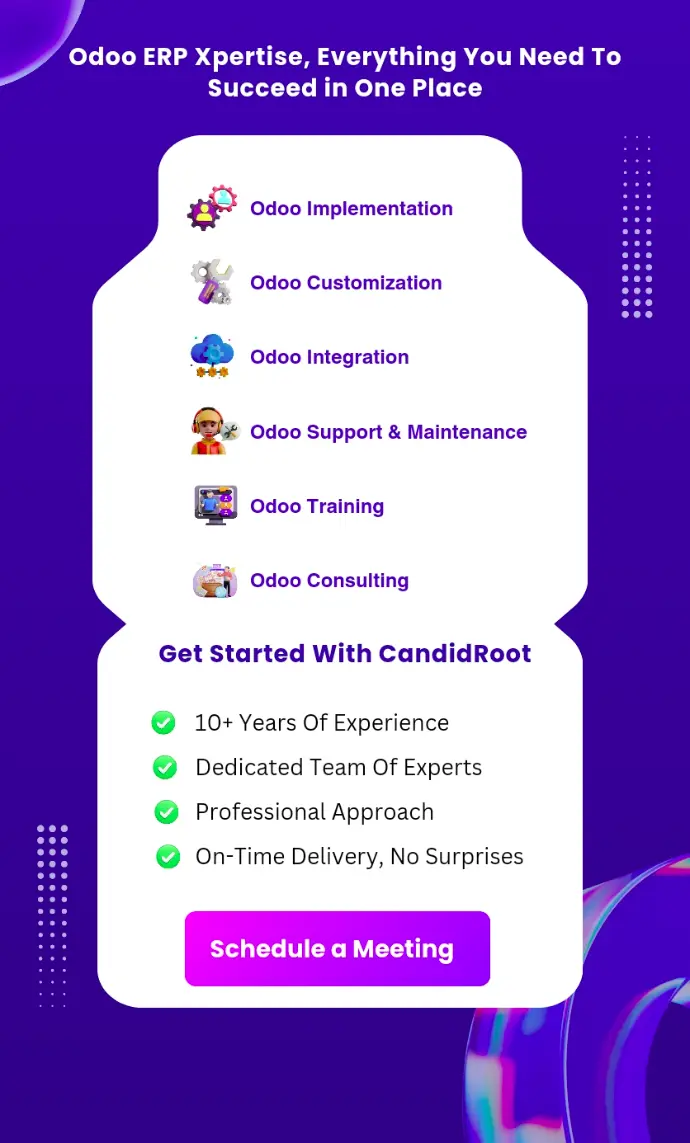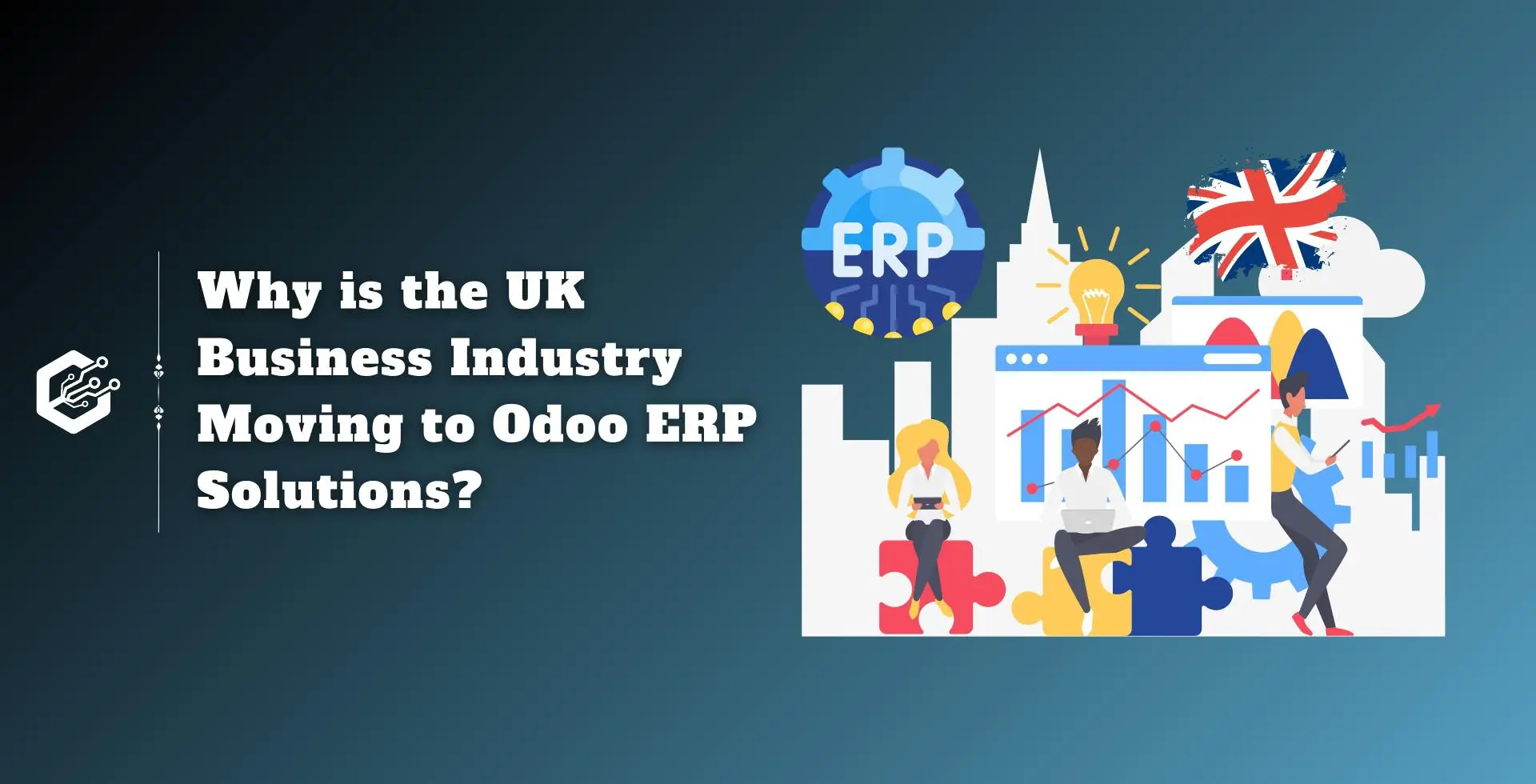Live analytics and artificial intelligence will have a significant impact on the ERP landscape in 2025. ERP systems are central to digital transformation as companies prioritize agility and decision-making. The enterprise resource planning software industry is expected to generate US$55.88 billion in sales by 2025. The market is anticipated to reach an estimated US$65.74 billion by 2030 by growing at a consistent CAGR of 3.30 percent from 2025 to that year.
The top ERP trends in 2025 include industry-specific modules and hyper-automation by demonstrating how technology is changing enterprise operations and helping companies stay competitive in a world economy that is changing quickly. Let’s dive into the blog to learn more about ERP trends.
ERP Trends to Watch in 2025
ERP systems are the digital backbone of modern business. Here are the top 20 ERP trends you should watch out for in 2025.
1. AI-Driven Decision Making
ERP systems are undergoing a revolution due to artificial intelligence. It offers data-driven insights that facilitate quicker and better decision-making. ERP platforms use AI algorithms to evaluate large datasets, forecast trends, and offer suggestions. Anticipate AI will advance from reporting to prescriptive decision-making by 2025, assisting CEOs in selecting the optimal course of action in situations that arise in real time.
2. Composable ERP Architecture
Composable ERP reduces the need for inflexible, monolithic systems by enabling companies to select modules according to their unique requirements. Agility and quicker invention are encouraged by this modular strategy. Composable ERP guarantees that businesses may swiftly adjust by merging or changing components without completely redesigning the system, which is crucial since business needs change quickly.
3. Cloud-Native ERP Platforms
Cloud-native ERP trends are still leading as companies look for ongoing updates, scalability, and cost-effectiveness. Most newly implemented ERP systems by 2025 will be cloud-based by providing smooth integration, instant access to data, and improved cross-border cooperation. Cloud-native ERP platforms offer better performance, stronger security, and more system resilience than legacy systems because they are designed especially for the cloud environment.
4. Hyper Automation in ERP Systems
Hyper automation is the practice of automating complicated business operations using robotic process automation and machine learning. ERP systems will use hyper-automation more and more to improve workflows, reduce manual involvement, and reduce boring jobs. Hyper-automation will increase operational efficiency and decrease errors in all processes by including inventory management, staff onboarding, and invoice processing.
5. Industry-Specific ERP Solutions
The growing need for sectoral ERP solutions is another significant ERP trend in 2025. The specific needs of industries like manufacturing and construction can no longer be satisfied by generic systems. Vendors provide customized ERP modules that fit industry rules, procedures, and difficulties. These specialized solutions guarantee a higher return on investment, quicker deployment, and cheaper customization expenses.
6. Integrated AI-Powered Assistants
Virtual assistants with AI capabilities are improving how users engage with ERP systems. These clever bots employ natural language processing to assist users with chores and provide suggestions instantly. The integrated AI will be commonplace in ERP systems, revolutionizing how users handle complicated data and carry out daily tasks. ERP users benefit greatly from increased productivity as AI grows more perceptive and context-aware, allowing enterprises to concentrate on strategy and innovation rather than day-to-day administrative duties.
7. Advanced Predictive Analytics
Using statistical modeling, AI algorithms, and historical data, ERP systems can offer insights into future trends and expansion prospects. The business will forecast sales and improve resource allocation using advanced predictive analytics integrated into its ERP. It is the major ERP trend you should watch out for.
8. ERP Integration with IoT Devices
ERP systems are developing to interface with smart devices throughout the company as the Internet of Things (IoT) expands. ERP integration with IoT provides automation and real-time insight for anything from shipping tracking to manufacturing machine health monitoring. This connectivity will improve user asset management by increasing productivity and reducing downtime.
9. Enhanced Mobile ERP Capabilities
Improved mobile ERP capabilities are essential for expanding the number of mobility workers. Full-featured mobile applications from modern ERP platforms allow users to access data and approve workflows. The mobile ERP trends in 2025 will play a major role in making voice commands and biometric security. ERP providers are giving priority to responsive design and mobile-optimized features as mobile devices grow in power and security, reshaping how contemporary businesses remain connected and competitive in a quickly changing digital landscape.
10. ERP and Blockchain Integration
ERP systems are made more transparent and secure by blockchain technology. Supply chain tracking, contract management, and audit trails are just a few domains where ERP and blockchain integration will be crucial. This ERP trend is particularly useful in sectors where traceability and data integrity are essential. Smart contracts can automate payment triggers based on delivery confirmation. Blockchain decentralization offers a new level of trust and integrity to ERP data flows.
11. ERP for Environmental, Social, and Governance (ESG) Compliance
Sustainability has become a major priority of all businesses, and ERP systems are evolving to accommodate ESG objectives. The ERP platforms will provide solutions for tracking carbon footprints and ensuring compliance with worldwide legislation. Companies can integrate financial performance and social responsibility goals by incorporating ESG measures into their core operations.
12. AI-Driven Financial Management
AI is revolutionizing financial operations in ERP systems. AI improves the accuracy and speed of financial management by automating expenditure reporting and detecting irregularities in transactions. By 2025, the ERP platforms will incorporate AI for real-time budgeting and compliance reporting by allowing CFOs to make more strategic financial decisions with fewer errors. As a result, the finance function becomes more strategic, driving profitability while ensuring compliance.
13. Democratization of ERP with No-Code or Low-Code Platforms
One of the most empowering ERP trends is the democratization of software development using no-code and low-code platforms. These technologies enable users with zero technical knowledge to make workflows and apps for ERP systems without writing a single line of code. This ERP trend in 2025 will reduce IT dependency and increase innovation.
14. Hyper-Personalized User Experience
ERP solutions are evolving beyond the basic approach. By 2025, hyper-personalization will revolutionize user experiences through AI-powered content recommendations and customized interfaces. Businesses may boost efficiency and enhance user experience by personalizing their ERP system. Companies can save operating expenses and improve speed and accuracy by integrating hyper-automation into their ERP. This ERP system turns it into a useful tool for digital transformation.
15. ERP Integration with the Internet of Things
ERP and IoT integration are changing the way businesses monitor operations and assets. In manufacturing, IoT-enabled sensors can send live data to ERP systems to improve equipment operation. The smart shelves and RFID tags in retail can automatically update inventory levels. ERP platforms will provide seamless integration by 2025. It allows the linked device to realize its potential fully.
16. Blockchain for Transparency and Security
The application of blockchain in ERP goes beyond financial transactions. The ERP systems in 2025 will employ blockchain to improve data security and ensure transparency across distributed networks. This is especially important for worldwide supply chains, where stakeholders require accurate and tamper-proof information. Blockchain provides an additional layer of trust to ERP data that traditional solutions cannot match.
17. Increased Focus on Cybersecurity
Cybercriminals are increasingly targeting ERP systems as they grow more networked and data-rich. Business ERP strategies are responding by giving more importance to cybersecurity. By 2025, ERP providers will have integrated the latest security measures. Organizations are implementing proactive measures to safeguard confidential company and customer information against ransomware.
18. Subscription-Based ERP Licensing Models
The old practice of acquiring ERP software licenses upfront is being phased out in favor of more adaptable subscription-based alternatives. Businesses will gravitate toward Software-as-a-Service ERP packages in 2025, which allow them to pay monthly or annually while growing services based on current demands. This methodology lowers capital expenditures and provides for faster ROI.
19. Improving Employee Experience
Enhancing employee experience is emerging as a significant ERP trend in 2025. It transforms how firms manage their workflows. Modern ERP systems increasingly include capabilities encouraging employee well-being and accommodating hybrid work situations. Personalized dashboards, self-service alternatives, and AI-driven insights empower employees. Companies use ERP to centralize HR services and promote collaboration. Organizations that integrate EX into ERP solutions enhance retention while gaining a competitive advantage by attracting people to the fast-changing digital landscape.
20. Advanced Data Analytics and Data Integration
In 2025, ERP systems will integrate advanced data analytics and business intelligence (BI) capabilities directly into dashboards. Decision-makers can use embedded analytics to examine real-time KPIs, execute ad hoc analysis, and generate visual reports without the need for external BI tools. Predictive analytics may also help with demand forecasting, pricing optimization, and improving customer experiences.
Bottom Line
The ERP landscape of 2025 is more dynamic and intelligent than ever before. Today’s ERP is more than just a backend system, from AI-driven automation to industry-specific customization. Businesses that remain ahead of these trends will be better able to adapt, grow, and compete in a complex and fast-paced environment.
Choosing the correct ERP trends now entails investing in flexibility and scalability. As ERP platforms get smarter and more user-friendly, businesses must constantly examine their digital preparedness and match ERP expenditures with long-term business objectives. Implement the ERP system and have an advanced business!


